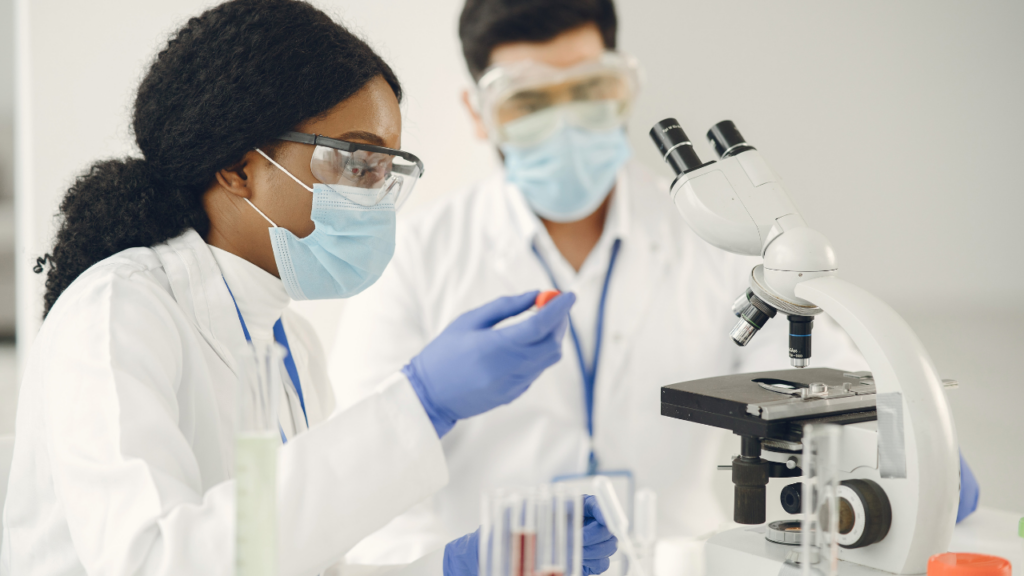|
Getting your Trinity Audio player ready...
|
Peptide therapy represents a rapidly growing field within the arena of drug development, harnessing the specificity and efficiency of peptides for therapeutic purposes. These small chains of amino acid residues have shown considerable promise in addressing a variety of health concerns, ranging from metabolic disorders and obesity to cancer and age-related diseases. As the understanding of peptide drugs’ biological activity deepens, their journey from laboratory research to clinical practice continues to evolve, fueled by advancements in technology and a keen focus on mitigating chronic diseases.
Peptide Drug Development
Peptide Drugs vs Traditional Drugs
Traditional small molecule drugs often target extracellular receptors or enzymes, while peptide therapeutics typically exhibit a broader range of biological targets, including intracellular and extracellular proteins. The complexity of peptides provides ample opportunity for engaging with various biological pathways essential in diseases such as cancer, diabetes, and obesity. Unlike monoclonal antibodies, peptides offer a middle ground in terms of size and specificity, which often translates to fewer off-target side effects and better receptor docking, enhancing their binding affinity and therapeutic index.
Advantages of Peptide Drugs
Peptide drugs stand out due to their high specificity and potency, with an ability to interact with cellular targets that small molecules can’t effectively reach. They offer a significant advantage in targeting protein-protein interactions (PPIs) crucial to disease progression. Additionally, advancements in peptide drug developments have shown that they can be designed to improve mitochondrial activity and even specifically initiate mitochondrial fission, which has far-reaching potential in addressing metabolic diseases.
Challenges in Peptide Drug Development
Despite their potential, peptide drugs face challenges in drug development, such as proteolysis, leading to short in vivo stability and degradation. Other hurdles include ensuring favorable pharmacokinetics and pharmacodynamics, as well as developing efficient strategies for their delivery, especially regarding intracellular targeting. Overcoming these issues requires innovative approaches to chemical modification and formulation.
Global Docking Methods in Peptide Drug Development
Docking methods have evolved to be a cornerstone of peptide drug development, offering a computational modeling framework for predicting how peptides interact with their biological targets. These methods account for the dynamic nature of both the peptide and the receptor, considering conformational flexibility and allowing for a more precise understanding of the binding interfaces. This predictive capacity is instrumental in enhancing the specificity and efficacy of therapeutic peptides.

Recent Advances in Peptide Therapy Research
Peptide Therapy Latest Research Trends
Research into peptide therapeutics has shifted towards investigating AMPK-targeting peptides as a way of modulating energy balance, which is particularly pertinent in the context of obesity and type 2 diabetes. Another significant trend is the exploration of cyclic peptides, which boast enhanced stability and biological activity due to their structural rigidity. Scientists are also probing the role of peptides in mitigating the effects of toxic biochemicals associated with metabolic diseases.
Computational Methods in Peptide Drug Design
Computational modeling has become an indispensable tool for peptide drug design, allowing for the exploration of a vast chemical space without the immediate necessity for labor-intensive laboratory work. Techniques such as in silico docking and virtual screening are crucial for identifying promising peptide candidates with favorable properties, resembling the research spearheaded at esteemed institutions like Johns Hopkins University.
Protein Interactions in Peptide Therapy
The intricate dance of peptide-protein interactions is of particular significance in the arena of therapeutic peptides. These interactions often involve complex assemblies of amino acid residues, each contributing to the binding affinity and specificity required for successful therapeutic outcomes. Understanding the nuances of these interactions helps in fine-tuning peptide structures to achieve the desired therapeutic strategies.
Key Aspects of Peptide—Protein Interactions
The key aspects of peptide-protein interactions include identifying and targeting binding interfaces, which are critical for achieving the desired functional effects on target proteins. Binding affinity and specificity are modulated by amino acid composition, sequence, and often post-translational modifications. The precise mapping of these interactions aids in the rational design of peptides with enhanced efficacy and reduced toxicity.
Docking Methods for Peptide—Protein Interactions
Docking methods applied to peptide-protein interaction studies are refined to account for the flexible and often transient nature of these complexes. These methodologies encompass a range of computational techniques that simulate the dynamic environment of cellular conditions, enhancing the predictive accuracy of peptide docking and binding analyses. This, in turn, informs the development of peptides with optimized therapeutic properties.
Computational Docking Strategies for Peptide Therapy
Computational docking strategies in peptide therapy delve into the intricate details of how peptides interact with their target receptors or enzymes. Advanced algorithms consider a multitude of factors such as conformational changes, intramolecular forces, and solvent effects to predict the most energetically favorable binding modes. Such strategies are integral in improving the therapeutic potential of peptide drugs, particularly in terms of binding affinity and specificity.
Backbone Modification for Peptide Leads
The chemical modification of peptide backbones has revolutionized the field, enhancing peptide stability against enzymatic degradation and increasing their half-life within biological systems. These modifications can also alter the peptide’s overall shape and charge, contributing to improved membrane permeability and aiding their entry into cells, which is a key factor in targeting intracellular disease mechanisms.
Intracellular Peptide Uptake Mechanisms
Addressing intracellular peptide uptake mechanisms is crucial for the effective delivery of therapeutic peptides. Strategies to increase cellular uptake include coupling peptides with cell-penetrating moieties and designing peptides capable of exploiting transport systems within hepatocytes and other cell types. Overcoming the challenges associated with intracellular delivery is a pivotal step in translating peptide therapies from bench to bedside.
Membrane Permeability of Peptide Drugs
Enhancing membrane permeability is a significant focus of peptide drug formulation, as it dictates the bioavailability and efficacy of peptide therapeutics. Researchers are constantly refining techniques to enhance this attribute, resulting in peptides that show promise for treating conditions previously thought intractable to this form of therapy. This focus is especially critical given the high blood glucose levels and weight gain associated with metabolic disorders that may be mitigated through effective peptide-based interventions.

Clinical Applications of Peptide Therapy
Peptide therapies have transitioned from theoretical constructs to tangible treatments for a myriad of clinical conditions. With an increasing number of peptide drugs entering the market, there is a growing recognition of their utility in addressing various diseases. For instance, peptides offer innovative ways to target proteins involved in cancer progression, and investigational therapies for obesity and type 2 diabetes show promising results. Their applications extend to rare diseases and hormone-related conditions, exemplified by the use of somatostatin analogs in endocrinology.
Future Directions in Peptide Therapy
The future of peptide therapy is bright, with continuous advancements in the field promising to address the therapeutic challenges of metabolic and age-related disorders. This includes the discovery of novel AMPK-targeting peptides and the utilization of peptides to regulate mitochondrial dynamics. The ongoing research and the expansion of this scientific domain hold the potential to dramatically improve health outcomes for patients across the United States and worldwide.
Annual gatherings such as the Peptide Summit have become crucial hubs for researchers, clinicians, and industry professionals to share the latest findings, discuss challenges, and forge collaborations that drive forward the development of innovative peptide-based treatments.
In Summary
Peptide therapy’s journey from research laboratories to clinical settings underscores the dynamic nature of this exciting field. As scientific understanding deepens and technological tools advance, the landscape of peptide drug development and application continues to evolve. These therapies have the potential to transform the approach to treating complex diseases, offering patients alternatives that are effective, targeted, and minimally invasive. As we look towards the future, it’s clear that peptide therapy will play a critical role in shaping the next generation of therapeutic solutions.
Disclaimer: Please note that many peptide therapies are not FDA-approved and their efficacy and safety have not been fully established. It is crucial to consult with your healthcare provider before starting any new supplements or treatments, including peptide therapy.
References
Fosgerau, Keld, and Torsten Hoffmann. “Peptide therapeutics: current status and future directions.” Drug discovery today 20, no. 1 (2015): 122-128.
Szeto, Hazel H. “Cell-permeable, mitochondrial-targeted, peptide antioxidants.” The AAPS journal 8 (2006): E277-E283.
Ciemny, Maciej, Mateusz Kurcinski, Karol Kamel, Andrzej Kolinski, Nawsad Alam, Ora Schueler-Furman, and Sebastian Kmiecik. “Protein–peptide docking: opportunities and challenges.” Drug discovery today 23, no. 8 (2018): 1530-1537.
Chapnik, Nava, Yoni Genzer, Avraham Ben-Shimon, Masha Y. Niv, and Oren Froy. “AMPK-derived peptides reduce blood glucose levels but lead to fat retention in the liver of obese mice.” Journal of Endocrinology 221, no. 8999.94 (2014).
Amadei, Andrea, Isabella Daidone, Alfredo Di Nola, and Massimiliano Aschi. “Theoretical-computational modelling of infrared spectra in peptides and proteins: a new frontier for combined theoretical-experimental investigations.” Current opinion in structural biology 20, no. 2 (2010): 155-161.
Blaszczyk, Maciej, Mateusz Kurcinski, Maksim Kouza, Lukasz Wieteska, Aleksander Debinski, Andrzej Kolinski, and Sebastian Kmiecik. “Modeling of protein–peptide interactions using the CABS-dock web server for binding site search and flexible docking.” Methods 93 (2016): 72-83.
Futaki, Shiroh. “Oligoarginine vectors for intracellular delivery: Design and cellular‐uptake mechanisms.” Peptide Science: Original Research on Biomolecules 84, no. 3 (2006): 241-249.
Witt, Ken A., Terrence J. Gillespie, Jason D. Huber, Richard D. Egleton, and Thomas P. Davis. “Peptide drug modifications to enhance bioavailability and blood-brain barrier permeability.” Peptides 22, no. 12 (2001): 2329-2343.







Peptide therapy is like the new kid on the block in the world of medicine, and it’s already showing so much promise! 🌟💉 From tackling aging and obesity to fighting cancer, these tiny amino acid chains are making big waves. It’s fascinating how they fill that sweet spot between traditional drugs and larger biological molecules, offering precision with fewer side effects. 🎯👩🔬
The journey from lab research to actual patient treatments is filled with hurdles, like making sure these peptides are stable enough to do their job in the body. But with cutting-edge docking methods and some smart biochemical tweaks, scientists are pushing forward. 💪🔬
It’s especially cool how peptides could help us tackle diseases on a cellular level, like turning the tide in metabolic disorders or even helping our brains stay sharp as we age. 🧠✨ Plus, with the ability to design peptides that can sneak into cells or even target specific proteins, the possibilities seem endless!
And while we’re still on the brink of fully understanding and utilizing these therapies, the potential for peptide drugs to revolutionize treatment for a range of conditions is incredibly exciting. 🌈💊
What do you all think about the future of peptide therapy? Are there any conditions you’re hopeful they’ll make a big difference in? Let’s discuss! 🗨️👥